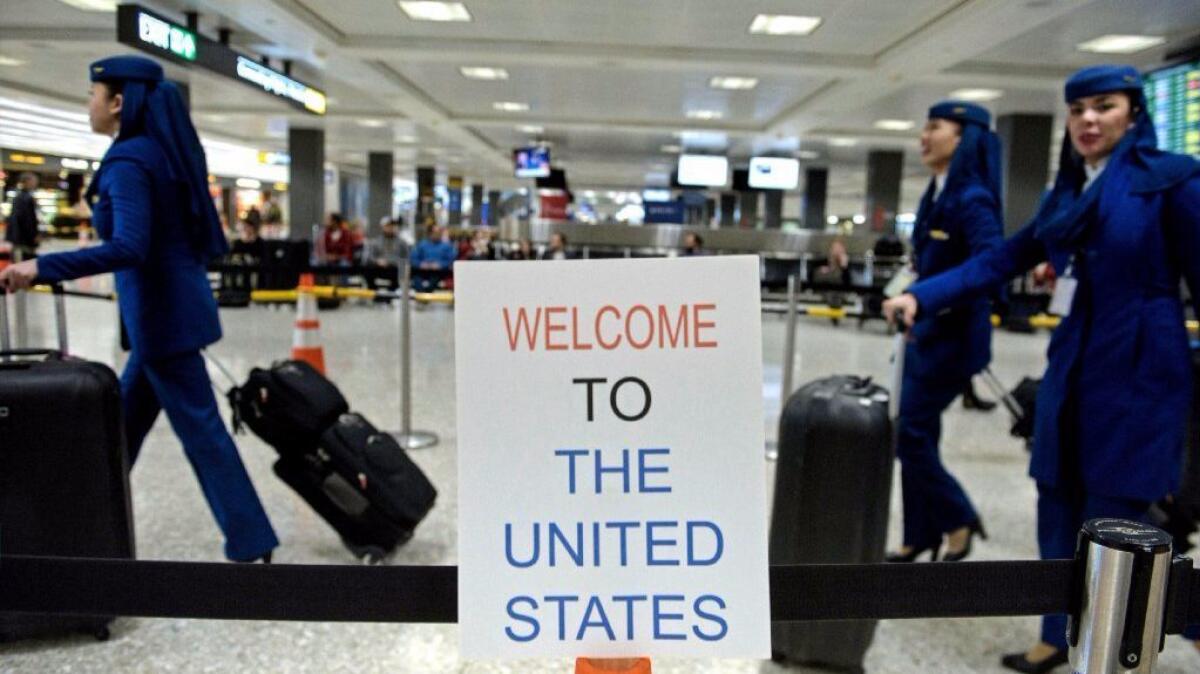U.S. and Britain ban laptops and tablets on flights from certain Middle Eastern and African countries

U.S. officials, citing intelligence information about terrorist threats, have banned electronic devices larger than a smartphone in the passenger cabins of international flights to the U.S. from eight Middle Eastern and African countries.
Shortly afterward, Britain announced a similar ban.
The airlines that serve the eight countries — Jordan, Egypt, Saudi Arabia, Qatar, Kuwait, United Arab Emirates, Turkey and Morocco — were given 96 hours to implement the U.S. ban, starting Tuesday morning, according to senior U.S. administration officials who spoke on the condition of anonymity.
The British government announced Tuesday that it too was banning such electronic devices on flights to Britain from six Middle Eastern and African countries: Jordan, Egypt, Saudi Arabia, Turkey, Lebanon and Tunisia. Britain acknowledged the U.S. ban and said it has “been in close contact with [the U.S. government] to fully understand their position.”
The U.S. ban requires passengers on such flights to put all laptop computers, electronic tablets and other devices larger than a smartphone into luggage checked into the cargo compartment. The British ban is similar, but it also bars some large smartphones from being carried into the cabin.
Senior U.S. administration officials declined to elaborate on the threats that prompted the ban, saying only that commercial airlines are still a target of terrorists who are trying to smuggle explosives in electronic devices.
The U.S. ban affects nine airlines: Royal Jordanian, Egyptair, Turkish Airlines, Royal Air Maroc, Saudia Airlines, Kuwait Airways, Qatar Airways, Emirates and Etihad Airways; the airlines operate about 50 daily flights to the U.S., according to the administration officials.
No U.S.-based airline flies directly to the U.S. from the 10 airports that serve the eight countries named by the U.S.
Los Angeles International Airport, however, gets direct flights from Saudi Arabia, Turkey, the United Arab Emirates and Qatar.
The U.S. Travel Assn., which represents the nation’s $2-trillion travel industry, said it supports efforts to keep travelers safe as long as security agencies communicate with the public about such restrictions.
“We urge the federal government to make every effort to minimize disruption to legitimate travelers by clearly and quickly articulating the details of the new policy to enforcement personnel and the flying public,” said Jonathan Grella, executive vice president of the U.S. Travel Assn.
U.S. officials would not say how long the ban will continue, saying only that it will be reevaluated on a regular basis. They also would not comment on why checking an electronic device in the cargo compartment is safer than carrying it in the cabin.
Royal Jordanian and Saudia Airlines used Twitter on Monday to alert their passengers about the new U.S. restrictions.
“Saudia Airlines would like to point out to dear guests that the United States transportation authorities have imposed a new procedure on trips heading to the United States,” Saudia Airlines tweeted.
To read more about the travel and tourism industries, follow @hugomartin on Twitter.
ALSO
Bitter pill to swallow: Less FDA oversight of supplements seems likely
Another step toward getting the nuclear waste off the beach at San Onofre?
UPDATES:
3:45 p.m.: The article was updated to list the direct flights to Los Angeles International Airport from countries that are affected by the electronics ban.
10:15 a.m.: This article was updated with news about Britain issuing a similar ban and a statement from the U.S. Travel Assn.
This article was originally published at 3 a.m.







